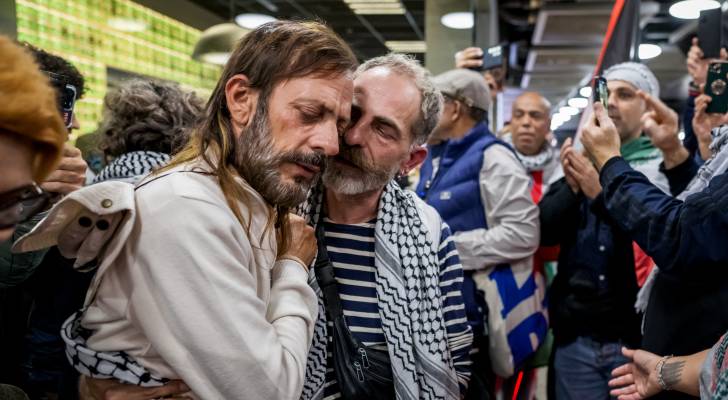Steve Mercier (left), one of the Swiss activists aboard vessels from the Global Sumud Flotilla (Credit: AFP)
"I felt like in hell in Israel": Sumud activists recount abuse in 'Israeli' detention
Multiple Sumud activists recounted harrowing mistreatment during detention in the Negev, highlighting severe abuse, deprivation, and neglect.
The activist said they were aware of their privileges, "I have white skin, blue eyes. I have a Swiss passport. They treated me much better than other passengers on board. That's white privilege." Yet even with this, the treatment was harsh.
They described being harassed and humiliated, forced to kneel under the sun for an hour with their heads to the ground, deprived of food and water, and treated like terrorists. "I didn't drink water for one day… I felt like in hell in Israel," they said.
Medical neglect was also severe. "Israel treated us terribly. It denied people essential medicine. Yesterday night we were shouting that someone was having a heart attack. They didn't come. They didn't care."
Food was described as infested with insects, and some detainees were subjected to torture. "One of my friends fainted on the plate because of the exhaustion that they subjected her to."
The activist compared the treatment of Europeans to Palestinians, noting, "This is how Israel behaves towards Europeans. You could only imagine how it treats Palestinians every single day."
Detainees were kicked, left without water for over two days, and denied communication with other boats. Greta Thunberg was humiliated, wrapped in an 'Israeli' flag, and displayed like a trophy.
The activist described freezing transport conditions, tight handcuffs cutting circulation, blindfolding, and being kept in a van for hours. "Some of the people got beaten, but a lot of swear words. They had so much rage and anger against us."
International attention was noted as a mitigating factor, "The people in the world made them behave better than what they were planning to behave. The people protected us by demonstrating and keeping their eyes on us."
All personal belongings were confiscated, leaving detainees with only passports, scarce food, and no access to necessary medicine for conditions like epilepsy or heart disease.




